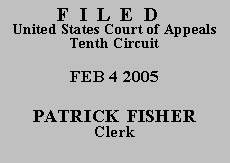

|
GRAYLING CHURN,
v.
RON WARD, individually, and as
Director of Department of Corrections |
|
Before EBEL, MURPHY, and McCONNELL, Circuit Judges.
Proceeding pro se, Grayling Churn appeals the district court's dismissal of the civil rights complaint he brought pursuant to 42 U.S.C. § 1983. Churn, an Oklahoma state prisoner, complains that Defendant deprived him of his personal property without due process of law. Churn asserts that he purchased a color television set with his own funds and that officials at the Oklahoma State Penitentiary permitted him to keep the television in his cell. When Churn was transferred to the Oklahoma State Reformatory, he was told that because of a drop in his earned credit level, he was no longer permitted to keep the television in his cell. The television is currently being stored in the property room at the Oklahoma State Reformatory.
Defendant moved to dismiss Churn's complaint. The district court granted the motion, concluding that the complaint failed to state a claim for which relief may be granted. Specifically, the court first ruled that Churn had no constitutionally protect interest in possessing a television in his cell. Hatten v. White, 275 F.3d 1208, 1210 (10th Cir. 2002) ("While an inmate's ownership of property is a protected property interest that may not be infringed without due process, there is a difference between the right to own property and the right to possess property while in prison."). The district court concluded that Churn's due process claim also failed because the confiscation of his television did not impose an "atypical and significant hardship" on him. Cosco v. Uphoff, 195 F.3d 1221, 1223-24 (10th Cir. 1999).
We have reviewed the record, the appellate briefs, and the applicable law and conclude that the dismissal of Churn's § 1983 complaint was proper. Accordingly, the district court's order dismissing Churn's complaint is affirmed for substantially the reasons stated in the magistrate judge's report and recommendation dated February 27, 2004 and in the district court order dated April 5, 2004. Churn's motion to proceed in forma pauperis is granted. Churn is reminded that he remains obligated to continue making partial payments until his appellate filing fee is paid in full. See 28 U.S.C. § 1915(b).
ENTERED FOR THE COURT
Michael R. Murphy
Circuit Judge
*. This order and judgment is not binding precedent, except under the doctrines of law of the case, res judicata and collateral estoppel. The court generally disfavors the citation of orders and judgments; nevertheless, an order and judgment may be cited under the terms and conditions of 10th Cir. R. 36.3.